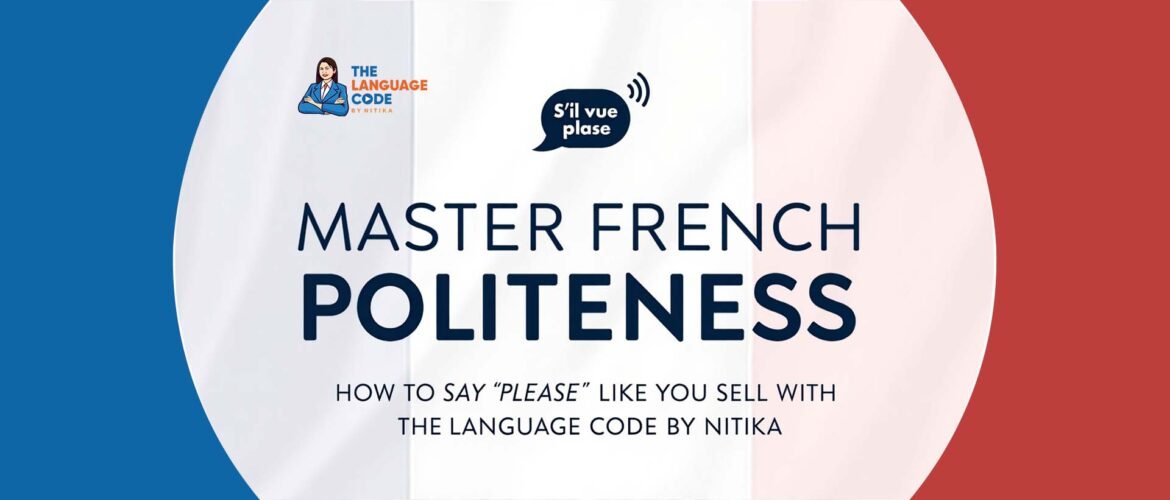Master French Politeness: How to Say “Please” Like a Native & Boost Your Skills with The Language Code by Nitika
- May 10, 2025
- Posted by: Nitika Dixit
- Category: Adverisement , French Language , TEF Canada ,

Ever wondered why a simple “please” can unlock doors in French culture? Whether you’re ordering a croissant in Paris or asking for directions in Marseille, using the right phrase matters. Let’s dive into the art of French politeness and how The Language Code by Nitika can transform your language journey!
The Magic of “S’il Vous Plaît” vs. “S’il Te Plaît”
In French, “please” isn’t one-size-fits-all. The classic s’il vous plaît (formal) and s’il te plaît (informal) are your golden tickets to politeness. Here’s how to use them:
- Formal Settings: Use s’il vous plaîtwith strangers, elders, or in professional scenarios.
Example: Un café, s’il vous plaît. (A coffee, please.) - Casual Conversations: Swap to s’il te plaîtwith friends or family.
Example: Passe le sel, s’il te plaît. (Pass the salt, please.)
But wait—there’s more! In urgent situations, a heartfelt je vous en prie (I beg you) adds gravity to requests.
Why Politeness is Non-Negotiable in French Culture
In France, etiquette is king. Skipping “please” can come off as rude, even if your tone is friendly. Nitika’s The Language Code emphasizes this cultural nuance, teaching learners to blend language skills with social awareness. Imagine charming a Parisian boutique owner by pairing s’il vous plaît with a smile—it’s a game-changer!
Beyond “Please”: Elevate Your French with The Language Code
Nitika’s guide isn’t just about phrases—it’s a blueprint for fluency. Here’s how it helps:
- Contextual Learning: Master when to use formal vs. informal speech.
- Cultural Hacks: Avoid faux pas by understanding unspoken rules.
- Memory Techniques: Retain tricky grammar with intuitive strategies.
Ever mixed up tu and vous? The book’s real-life scenarios and exercises turn these hurdles into stepping stones.
Your Next Step: Speak French with Confidence
Ready to go beyond “please”? The Language Code by Nitika is your ally. Whether you’re prepping for travel, work, or personal growth, this book decodes French in a way that’s engaging and effective.
FAQs: Your French Politeness Questions Answered
Q1: Why is “please” so important in French?
A: Politeness is deeply rooted in French social norms. Using s’il vous plaît shows respect and cultural awareness, making interactions smoother and more positive.
Q2: Can I use “s’il te plaît” with someone I just met?
A: No! Stick to s’il vous plaît until you’re invited to use informal language. Over-familiarity can offend, especially in formal or professional settings.
Q3: Are there other polite phrases I should learn?
A: Absolutely! Phrases like merci (thank you), excusez-moi (excuse me), and de rien (you’re welcome) are essential. The Language Code covers these in detail!
Q4: What’s the biggest mistake learners make with French politeness?
A: Assuming formality isn’t important. French culture values hierarchy and respect, so mastering vous vs. tu is critical. Nitika’s book breaks this down effortlessly.
Q5: How does The Language Code help beyond basic phrases?
A: It teaches you to think in French by combining grammar, cultural context, and practical exercises. You’ll learn not just to speak, but to connect.
Conclusion: Speak French with Confidence and Courtesy
Mastering “please” in French is more than memorizing words—it’s about embracing a culture that values grace and respect. With The Language Code by Nitika, you’ll not only learn the language but also the subtle art of French communication. From nailing s’il vous plaît to avoiding awkward tu/vous mix-ups, this guide is your passport to sounding like a local.
Ready to dive deeper? Explore Nitika’s proven methods and unlock fluency faster. Start with mastering “please” here: How to Say Please in French, then let The Language Code take you further.
Bonne chance! (Good luck!) With the right tools, you’ll not only speak French—you’ll live it.
